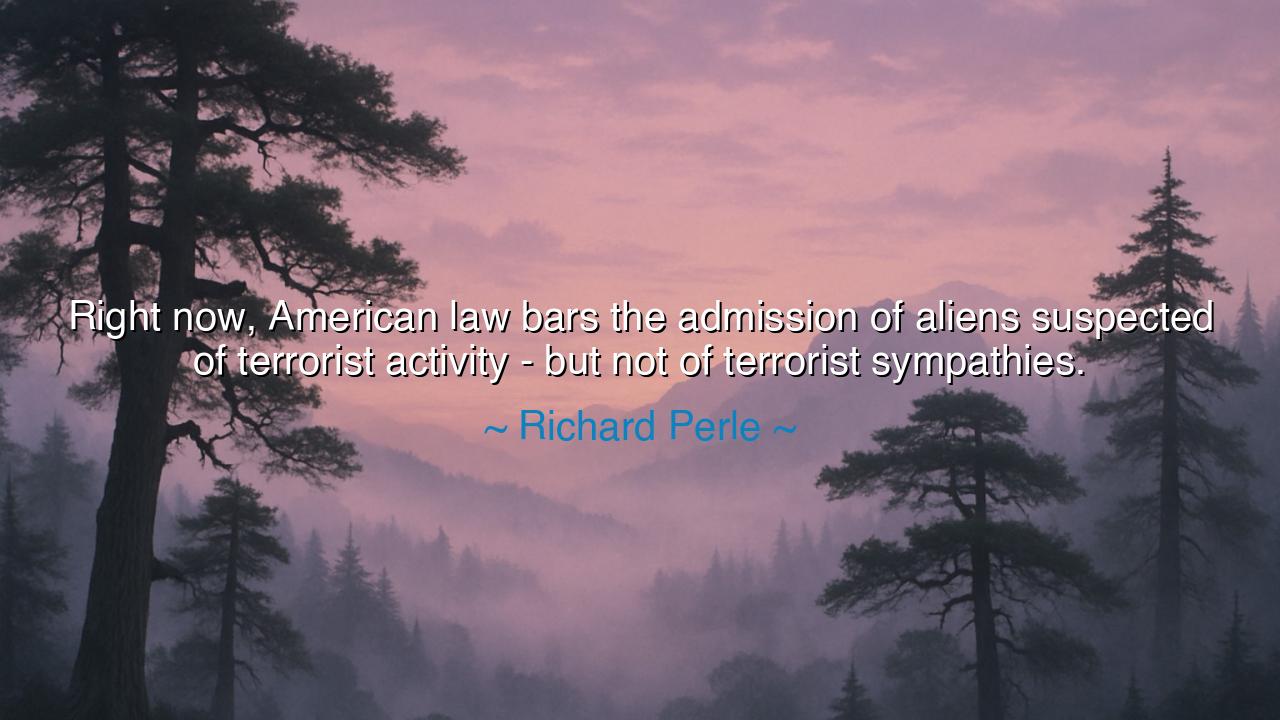
Right now, American law bars the admission of aliens suspected
Right now, American law bars the admission of aliens suspected of terrorist activity - but not of terrorist sympathies.






Listen well, children, for the words of those who understand the complexities of law and human judgment carry lessons that transcend time and place. Richard Perle, a thinker who has pondered the balance between security and freedom, once said: "Right now, American law bars the admission of aliens suspected of terrorist activity - but not of terrorist sympathies." These words strike at the heart of a fundamental dilemma—how do we define the boundary between security and freedom? How do we, as a society, judge the difference between those who are a direct threat and those who hold dangerous beliefs, yet may not act upon them? This is a question that has echoed through the ages, in societies that have grappled with the balance between justice and protection.
In the ancient world, the issue of security and freedom was not foreign. The Athenians, for example, prized their democratic ideals and the freedom of their citizens. Yet, in times of war or invasion, they were quick to impose strict limits on who could enter their city-state. The trial of Socrates serves as a potent example of how fear of external threats can lead to internal repression. Socrates, a philosopher who challenged the beliefs of the time, was condemned to death by a democracy that feared his ideas might weaken the unity of the city-state. His execution was not just about his actions, but about the sympathies he was thought to inspire—ideas that could undermine the security of the state. Perle’s words, though modern, reflect this ancient tension: when fear of external threats takes hold, the line between action and thought becomes blurred, and sometimes the innocent are judged alongside the guilty.
Consider, children, the example of Cicero, the Roman statesman and philosopher, who lived in the final days of the Roman Republic. Cicero, known for his eloquent speeches, once sought to address the threats to Rome from within. In his Philippics, he denounced Mark Antony as a threat to the republic, but also warned that those who harbor dangerous ideas, or sympathies, can also be just as dangerous. Cicero’s fear of an internal enemy led him to adopt measures that curtailed the freedom of his people, in the name of protecting the state. Yet, as history shows, the very measures that Cicero enacted to protect Rome ultimately contributed to its downfall, for the rule of law was undermined in the name of security. Perle’s insight reminds us that the challenge of balancing security and freedom is not a new one, and that sometimes the measures we take to protect ourselves can end up eroding the very values we seek to preserve.
As Perle suggests, the law currently bars those suspected of terrorist activity from entering the country, yet sympathizers—those who may not take direct action, but whose beliefs support or encourage violence—are allowed to pass through the gates. This raises the difficult question: should we fear the actions of others more than the beliefs they hold? This dilemma is echoed in the story of Plato’s Republic, in which Socrates contemplates the role of the guardians—those entrusted with the protection of the city. Plato suggests that the guardians must not only be strong in body, but also in their minds, for it is the ideas within the hearts of men that can lead to the destruction of the city. Just as Plato feared the spread of dangerous ideas, so too must we confront the risk of harboring those whose beliefs may lead to harm.
The lesson here, children, is not that we should fear all those who think differently, but that we must recognize the dangers that can arise when beliefs—unchecked by reason and compassion—take root and grow unchecked. Perle’s reflection calls us to reflect on how ideas shape the world. We must ask ourselves: should we focus only on what people do, or should we also consider what they believe, and whether those beliefs, if allowed to flourish, might ultimately lead to harm? The line between security and freedom is not always clear, and the tension between protecting the state and protecting the individual is one that has plagued humanity throughout history.
In your own lives, children, remember this: ideas have power—sometimes more power than we realize. Be careful of the beliefs you allow to take root in your hearts. They shape your actions, even when you may not realize it. But also, understand that freedom to hold different beliefs is sacred. Yet this freedom must be tempered with the wisdom to recognize when a belief begins to harm others. The ancients knew that thoughts and actions are intertwined; what we believe shapes what we do. And so, as you walk through the world, strive for balance—to protect the freedom of ideas, but to also safeguard the well-being of society.
Children, as you grow, remember this eternal struggle between freedom and security. Do not allow fear to lead you to make rash decisions that infringe upon your truth. But also, be wise in recognizing that not all ideas are equal—some, when left unchecked, can lead to destruction. Let the wisdom of the ancients guide you in striking the right balance: protect the ideals that sustain a free society, but recognize that some beliefs, if allowed to grow unchecked, can poison that very society. In this, you will find the true strength of your people.






AAdministratorAdministrator
Welcome, honored guests. Please leave a comment, we will respond soon